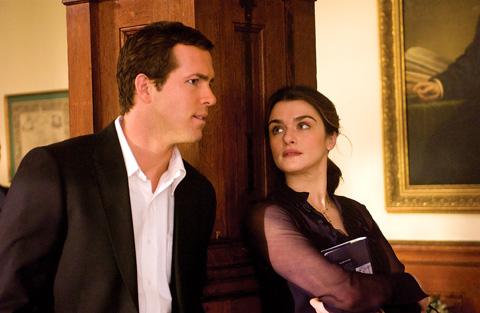Definitely, Maybe, a nimble and winning little romance written and directed by Adam Brooks, begins with one of those awkward Important Talks that parents are sometimes required to have with their children. In this case Maya Hayes (Abigail Breslin) needs some debriefing after a sex education class at her Manhattan elementary school. She’s acquired some technical vocabulary but not a lot of context, and so it falls to her dad, Will (Ryan Reynolds), to do the necessary explaining.
This is a delicate task since in the grown-up world of love, theory and practice frequently part company, which is what Will and Maya’s mother have recently done. Like any parent, Will wants to tell his daughter the truth without subjecting her to unnecessary disillusionment or cynicism. And Brooks faces a similar challenge, one that lesser romantic comedies tend to flee.
How do you preserve the fairy-tale elements of the genre — the beguiling fantasy of permanent bliss — in the face of certain prosaic and unavoidable facts? In the real world, after all, people divorce, sleep around, fall in love too soon, too late or too often.

PHOTOS COURTESY IF UIP
It’s a mess, and a movie like this one has to acknowledge the mess without falling into it, in which case it would be a sad little melodrama rather than a sparkling comic enchantment. In spite of everything, viewers, like Maya, have to walk away with our faith in soul mates and happy endings confirmed, rather than compromised or shattered.
So Will decides to tell Maya a slightly edited, PG-13 version of the story of his life and loves before she was born. At first the ending seems predictable enough: after various false starts and digressions, he will finally meet and marry her mommy. But neither the girl nor the audience knows which of the women his younger self meets the mother will turn out to be. (And for a while we forget that, after their happy ending, Mom and Dad will end up divorced.)
The candidates are neatly — but not too neatly — sorted by hair color and temperament. Emily (Elizabeth Banks), the obliging, blond college sweetheart; Summer (Rachel Weisz), the intriguing, slightly dangerous dark-haired intellectual; and April (Isla Fisher), the impetuous redhead with whom Will trades insults at the New York campaign headquarters of Bill Clinton.

PHOTOS COURTESY IF UIP
Ah, the 1990s. Among the many charms of Definitely, Maybe is the way it evokes the recent past without drowning in fussy period detail. Will, ambitious and idealistic, has come east from Madison, Wisconsin (leaving Emily behind), to plunge into the world of electoral politics; and while this movie is hardly an incisive political satire, it does capture some of the flavor of the times and, more generally, the headiness of youthful commitment to a cause.
Which is followed, perhaps inevitably, by disappointment. It is not hard to see that the Will of 1992 — smart, handsome, decent, happy in love, successful at work — is headed for a series of falls. Reynolds is dashing and sarcastic enough to fight off the lingering threat of blandness, and a subtle enough actor not to spoil his character’s unhappiness with self-pity. Will is, for all that, a bit of a cipher, or at least a sort of median Gen X-er, his edges smoothed away and his unruly appetites tamed.
Or maybe he’s just too modest and amiable to insist on being the most interesting person in his own story. Instead Reynolds is part of an attractive ensemble that includes Derek Luke, as Will’s best friend and sometime partner (they start a political consulting firm together after 1992), and Kevin Kline, as an aging gonzo journalist who is Will’s chief rival for Summer’s affection.

PHOTOS COURTESY IF UIP
But it is the women in Will’s life — including Breslin — who make up the affectionate, unsentimental heart of the film. Fisher in particular enlivens every scene she’s in with a comic energy that’s antic and graceful.
“Darlin’ you can’t love three,” says an old folk song, and in movies of this kind the man who does is likely to be viewed as a cad. Either that, or the women he doesn’t end up with will be shown to have such egregious flaws that their rejection will come as a relief.
Emily, Summer and April are all decidedly imperfect, but Brooks succeeds in showing how their shortcomings are, especially at first, part of their allure. He also makes clear that Will, besotted with each in turn, does not know any of them as well as he thinks he does. He also is not quite sure what he wants. The treachery of love — and also its promise — is that people can surprise you.

PHOTOS COURTESY IF UIP
And so can movies. I’ve been known to complain about the abysmal quality of contemporary American romantic comedies, which forsake intelligence, individuality and emotional risk for crude sex jokes or gauzy bridal-magazine fantasies. While Definitely, Maybe is hardly perfect, it navigates the choppy waters of modern courtship with commendable, understated honesty. Perhaps the best evidence of this is that this movie, unlike almost every other Hollywood tale of New York singles, was actually filmed in the city.

Oct. 27 to Nov. 2 Over a breakfast of soymilk and fried dough costing less than NT$400, seven officials and engineers agreed on a NT$400 million plan — unaware that it would mark the beginning of Taiwan’s semiconductor empire. It was a cold February morning in 1974. Gathered at the unassuming shop were Economics minister Sun Yun-hsuan (孫運璿), director-general of Transportation and Communications Kao Yu-shu (高玉樹), Industrial Technology Research Institute (ITRI) president Wang Chao-chen (王兆振), Telecommunications Laboratories director Kang Pao-huang (康寶煌), Executive Yuan secretary-general Fei Hua (費驊), director-general of Telecommunications Fang Hsien-chi (方賢齊) and Radio Corporation of America (RCA) Laboratories director Pan

President William Lai (賴清德) has championed Taiwan as an “AI Island” — an artificial intelligence (AI) hub powering the global tech economy. But without major shifts in talent, funding and strategic direction, this vision risks becoming a static fortress: indispensable, yet immobile and vulnerable. It’s time to reframe Taiwan’s ambition. Time to move from a resource-rich AI island to an AI Armada. Why change metaphors? Because choosing the right metaphor shapes both understanding and strategy. The “AI Island” frames our national ambition as a static fortress that, while valuable, is still vulnerable and reactive. Shifting our metaphor to an “AI Armada”

When Taiwan was battered by storms this summer, the only crumb of comfort I could take was knowing that some advice I’d drafted several weeks earlier had been correct. Regarding the Southern Cross-Island Highway (南橫公路), a spectacular high-elevation route connecting Taiwan’s southwest with the country’s southeast, I’d written: “The precarious existence of this road cannot be overstated; those hoping to drive or ride all the way across should have a backup plan.” As this article was going to press, the middle section of the highway, between Meishankou (梅山口) in Kaohsiung and Siangyang (向陽) in Taitung County, was still closed to outsiders

The older you get, and the more obsessed with your health, the more it feels as if life comes down to numbers: how many more years you can expect; your lean body mass; your percentage of visceral fat; how dense your bones are; how many kilos you can squat; how long you can deadhang; how often you still do it; your levels of LDL and HDL cholesterol; your resting heart rate; your overnight blood oxygen level; how quickly you can run; how many steps you do in a day; how many hours you sleep; how fast you are shrinking; how